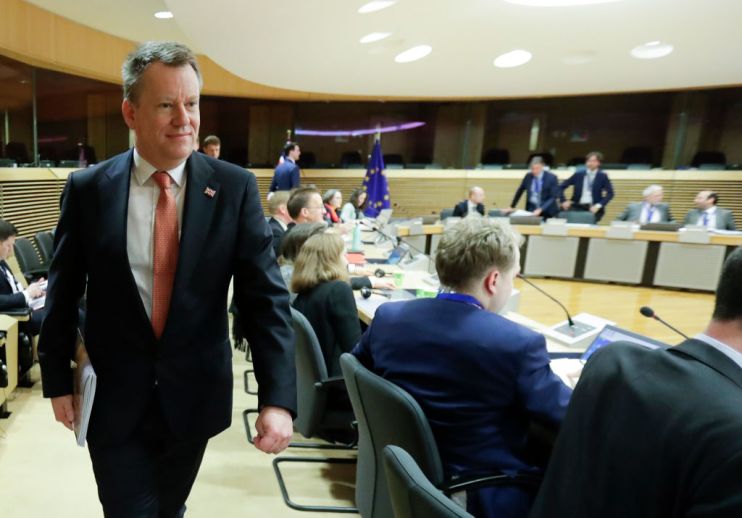Exclusive: Growing divide in Boris Johnson’s Brexit unit over trade deal extension
There is a growing divide in opinion within the government’s Brexit trade deal negotiating unit over whether to seek an extension to the 31 December deadline during the coronavirus crisis.
Civil servants are increasingly frustrated that the government refuses to countenance the idea of an extension, while political appointees are keen to press home the UK’s departure.
David Frost, a former diplomat and one-time ambassador to Denmark, is the UK’s chief negotiator and his 40-strong team consists of a mix of politically appointed advisers and civil servants.
The unit began a week-long negotiating round on Monday, with a further two planned over the next five weeks.
Multiple sources told City A.M. there was concern among civil servants in the negotiating team about Downing Street’s hardline refusal to contemplate granting an extension to the trade deal’s 31 December deadline.
A different view is held by the so-called “true believers” in the unit, who are adamant there should be no extension to the deadline and are comfortable at the prospect of leaving the European Union with no trade deal if need be.
The core of Frost’s politically appointed team is made up of Vote Leave veterans and the former communications boss of free market think tank the Institute of Economic Affairs.
A source with knowledge of the situation said the civil servants “are more or less the same group…that were there under the May years” and that they “have very different attitudes from David Frost and the people he’s brought in around him”.
Another said it “wasn’t a huge fissure yet”, but that it will likely be a “live issue” in a few months’ time.
It is widely understood that Brussels would be prepared to discuss an extension, but the Prime Minister’s official spokesman last week said Downing Street would refuse any extension request from the EU.
A source close to Frost said: “There is no debate about this issue and ministers continue to be clear that extending the transition period would prolong the negotiations and increase uncertainty, whilst also leaving us bound by EU legislation and obliged to make further payments into the EU budget.
“The negotiating team – which works within a policy remit set by ministers – operates as one, with civil servants and political advisers collaborating extremely closely.”
It comes as a group of civil service grandees came out this morning to urge Number 10 to seek an extension.
Philip Rycroft, the former chief civil servant in the now defunct Brexit department, told Prospect that “it is simple common sense to ask for an extension of the transition period”.
Former cabinet secretary Gus O’Donnell agreed with Rycroft’s assessment.
“More time could lead to a better outcome for both sides,” he said.
“Clearly there has been much less time for negotiation than could ever have been anticipated.”
There has been a litany of calls for an extension to the negotiating timetable in the wake of the coronavirus pandemic, including from International Monetary Fund (IMF) chief Kristalina Georgieva.
She said last week that the deadline should be extended to “reduce uncertainty” for the global economy.
The UK is currently in a transition period, where it is still operating under EU rules and regulations.
If no deal is struck by 31 December then new taxes and trade barriers will be implemented on World Trade Organisation (WTO) terms between the EU and UK.
Iain Anderson, founder of City communications firm Cicero Group, said Square Mile companies would likely be hoping for an extension to the 31 December deadline.
“Broadly there is a sense that if we could get an extension I think that would be welcome,” he said.
“Firms will have enough to deal with trying to move their businesses forward already.”
Veteran City of London pundit David Buik said an extension was inevitable, but that the government’s negotiating team should not concede that yet.
“Of course they will have an extension in the end, I don’t think it’s possible to do the deal in that time, but if the UK gives an inch now the EU will take miles,” he said.
“As far as I’m concerned they shouldn’t be let off the bridle until the very end.”
A Downing Street spokesperson said it was “completely untrue” that there was a split in the team and that “the Prime Minister has made clear he has no intention of changing” the 31 December deadline.
